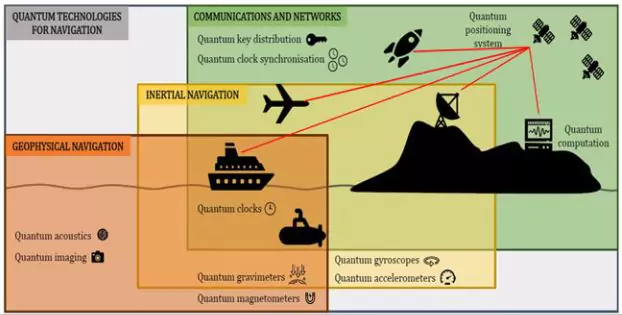India is increasingly focusing on the Quantum Magnetic Navigation System (QMNS) for navigation in GPS-denied environments, especially in the face of rising GPS disruptions in modern conflicts.
- It has potential to leapfrogging traditional satellite navigation systems and securing sovereign, denial-proof navigation technology.
Need For Quantum Magnetic Navigation System
- Satellite Navigation Disruptions: GPS, along with other satellite navigation systems like Glonass, Galileo, and BeiDou, is vulnerable to jamming, spoofing, and cyberattacks.
- These disruptions, seen in conflicts from Ukraine to West Asia, are making it clear that a more resilient navigation system is needed.
- Limitations of Current Alternatives: Existing alternatives like Inertial Navigation Systems (INS), terrain contour matching (Tercom), and AI-based corrections each have their weaknesses.
-
- For instance, INS can drift, Tercom struggles in flat terrain, and encrypted signals can still be jammed in high-threat zones.
Quantum Magnetic Navigation System (QMNS)
- QMNS uses quantum sensors (quantum magnetometers) to detect the Earth’s magnetic field variations, offering precise navigation without the need for GPS or satellite signals.
- This system relies on:
- Quantum Magnetometers: These sensors measure tiny magnetic field variations with extreme sensitivity using quantum properties of atoms.
- Magnetic Anomaly Maps: Detailed representations of the Earth’s magnetic “fingerprints,” created from variations in the planet’s crust.
- Inertial Navigation System (INS): Enhances the precision of quantum sensors by combining them with traditional navigation methods.

- Advantages:
- GPS Denial-Proof: Since QMNS doesn’t rely on satellite systems, it is immune to jamming or spoofing.
- Drift-Free: Unlike other systems, QMNS offers long-term accuracy without drifting over time.
Strategic Military and Economic Implications
- Defense Applications: QMNS is poised to be a key technology for remote air warfare and underwater military operations, ensuring precise navigation even in GPS-denied environments.
- Economic Implications: With the increasing importance of ocean resources and maritime security, QMNS will enable precise autonomous undersea operations—a significant advantage for military submarines and economic activities like ocean resource extraction.
- Versatile Use: Beyond defense applications, QMNS is also beneficial for economic activities like undersea mining, oil exploration, and subsea cable inspection.
Global Race and Developments
- The US and China have already been investing in quantum magnetometer technology for military use, particularly for submarines and stealth drones.
- Prototypes have undergone testing since the early 2020s, and field-ready systems are expected to be deployed post-2027 by the US Defense Advanced Research Projects Agency (DARPA).
Conclusion
QMNS offers India a robust, GPS-independent solution as global reliance on quantum technologies in military operations grows, QMNS is poised to be a key asset for India, especially in underwater operations and in enhancing its defense capabilities.
![]() 8 Aug 2025
8 Aug 2025


